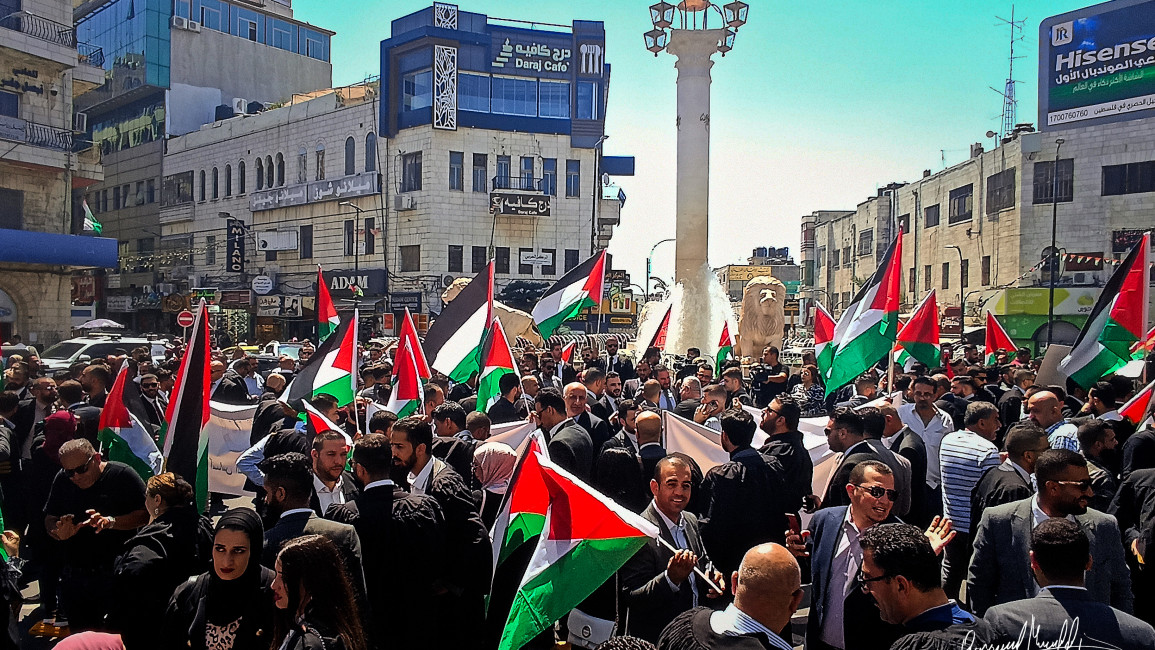Palestinian lawyers protest in Ramallah against legislation by decree
Hundreds of Palestinian lawyers marched in Ramallah on Tuesday to protest against the continuous establishing laws by decree by the Palestinian Authority.
The march was intended to head towards the Palestinian presidency headquarters at the Al-Muqataa compound in Ramallah, before stopping at a barrier built by the Palestinian police force.
"We decided to march today to deliver a message to the president Mahmoud Abbas, confident that he will hear us," Suheil Ashour, president of the Palestinian Bar Association told The New Arab.
"Our message to the president is that legislation by decree, which affects the rights and liberties of Palestinians must stop," Ashour stressed.
"This way of making laws came as a result of the abnormal conditions of the Palestinian people's political life," Ashour added. "Since these conditions continue, our precise demand is the rationing and revision of all the laws-by-decree that have been issued, and call upon the resuming of the normal legislative procedure."
"احنا بنقاتل عشانك وعشان أولادك"
— Sheemapress (@Sheemapress1) July 5, 2022
كلمات يعتصرها الألم وجهها المحامي مندي أوسطه لعناصر أمن السلطة الذين اعترضوا مسيرة المحامين المتوجهة إلى مقر المقاطعة في رام الله لتسليم رسالة بمطالب النقابة حول القرارات بقانون الأخيرة pic.twitter.com/YWDUhLfVWj
The Palestinian elected law-making body for the West Bank and Gaza, the Legislative Council, has been inactive since 2007. The council's sessions were suspended following the Palestinian political division between Fatah and Hamas.
Since then, the law-making process in Palestine is by presidential decree, often after suggestions from the government.
In December 2018, the Palestinian constitutional court officially dissolved the legislative council
The Palestinian "National Policies Agenda" document, updated every year, stipulates that law projects have to be discussed with the Palestinian civil society before being proposed to the president for ratification. However, this is rarely the case.
In 2017, the PA issued "the Electronic Crimes Law". Human rights groups considered the law to be a restriction of freedom of speech, especially since it allowed the general prosecutor to initiate the process of blocking any website.
Dozens of websites were effectively blocked in the following months. The law was amended later, following widespread criticism.
In March 2021, another law-by-decree forced non-profit organizations to submit their programs and budgets to the Palestinian government. Palestinian lawyers and non-profit workers protested at the time considering the law as a means to clamp down on the NGO sector.
مسيرة حاشدة نظمتها نقابة المحامين الفلسطينيين في مدينة رام الله احتجاجا على عدد من الامور القضائية للمطالبة بعدد من التعديلات pic.twitter.com/Vhh45E7paE
— Rafat Darawsheh 🇵🇸 𓂆 (@rafatdarawsheh) July 5, 2022
"Another example is the amendments made on the criminal procedure law," Zainab Salfiti, a lawyer taking part in the protest in Ramallah on Tuesday, said to The New Arab.
"These amendments, made by decree, reduced the period time for appealing a court ruling to ten days," Salfiti noted. "It's just impossible for any lawyer to study a ruling that sometimes includes hundreds of pages, and prepare a case in ten days."
"The amendments also raised the cost of court procedures fees, which were already expensive and further limits access to justice for individuals of low income," she added.
Palestinians were scheduled to elect a new legislative council in May 2021 but they were called off and "postponed" by the Palestinian president one month before the due date.
Abbas said that he refused to hold elections as long as Israel did not allow Palestinians in Jerusalem to vote.



![President Pezeshkian has denounced Israel's attacks on Lebanon [Getty]](/sites/default/files/styles/image_684x385/public/2173482924.jpeg?h=a5f2f23a&itok=q3evVtko)



 Follow the Middle East's top stories in English at The New Arab on Google News
Follow the Middle East's top stories in English at The New Arab on Google News


